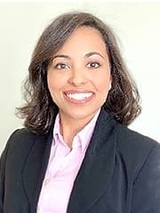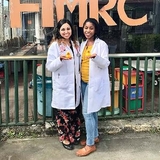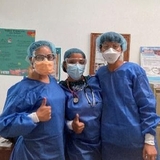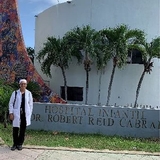
Prakriti Gill, MD, has a bachelor’s degree in Biology with a minor in Spanish from Emory University and a medical degree from Mercer University. She completed her pediatric residency at New York-Presbyterian/Weill Cornell Medical Center and her Pediatric Emergency Medicine (PEM) fellowship at Icahn School of Medicine at Mount Sinai in New York. She is CHOP’s first Acute Care Global Health Fellow.
Dr. Gill recently answered a few questions about her background and her interest in global health.
Can you share a little about yourself and how you became involved in global health?
My interest in medicine and global health developed at a young age as I grew up hearing about my great-grandfather, Dr. Khushdeva Singh. He won the Padma Shri Award, one of India’s highest national honors, for his tuberculosis (TB) thesis. In addition to setting up one of the first TB hospitals in Punjab, India, he also established a community school to increase access to education and founded a leprosy colony, providing a safe living facility for individuals diagnosed with leprosy, who often faced discrimination. Years after his passing, patients and their families continued to come to the family home in Punjab asking to see Dr. Singh. The positive and long-lasting impact he had on his community was awe-inspiring for me at a young age.

I found myself drawn to community engagement throughout my childhood and in college. When I was in college, I volunteered with the South Asian Health Initiative and my local Sikh temple (a gurdwara) at the Northlake Family Medicine practice in Atlanta. I also volunteered with the Macon Volunteer Clinic serving the local community when I was in medical school at Mercer University before moving to New York for residency. During residency, I worked at a federally qualified health center that cared for a large immigrant and refugee population, including a large Bangladeshi population. This was a unique opportunity to practice global health locally as I learned about immunization catch-ups, TB screenings, and experiences that were unique to the newly immigrated community. During residency, I also volunteered with the Foundation for International Medical Relief of Children in Costa Rica at a clinic that provided free medical care to uninsured women and children and Nicaraguan refugees.
We were deep in the COVID-19 pandemic for half of my PEM fellowship. Though this meant I had fewer travel experiences, working in the emergency department when New York City was the epicenter of the pandemic was a rich learning experience on local-global health. I learned a lot about disaster response and emergency preparedness. I also remained engaged in global health by volunteering with Health Volunteers Overseas to create educational orthopedic splinting videos for providers at Lao Friends Hospital in Laos as part of a remote teaching elective.
How do you connect your global health activities to your current role?
When thinking about my next steps after my PEM fellowship, I realized I wanted to pursue my global health work more deliberately. So when I saw a post from Alexandra Vinograd, MD, MSHP, DTM&H about CHOP’s Acute Care Global Health Fellowship, I responded within minutes. She designed a fellowship that was precisely what I was looking for: an opportunity that offered a structured introduction to global health, enabling me to learn about healthcare delivery in various settings while also working as a PEM attending in the CHOP Emergency Department (ED). Talk about an outstanding clinical experience!
Shortly after beginning my program in the fall of 2021, I completed a two-month global health rotation in the Dominican Republic (DR). I started out at CHOP’s partner clinic, Niños Primeros en Salud (NPS), in Consuelo. My favorite part of my work was accompanying the nurses and health promoters on home visits and getting a glimpse into our patients’ home lives. If someone couldn’t make it to an appointment, having this kind of fallback plan – where a health promoter would go to patients’ homes to remind them of their appointments and deliver nutrition packets – really made a difference. I also appreciate the longstanding partnership between CHOP and Centro de Salud Divina Providencia, which is rooted in mutual learning ― we learn from our DR colleagues as much as they learn from us.
After spending time with the NPS team, I went to Clínica de Familia La Romana (CFLR), a large family-centered community clinic in La Romana. I admire their mission, work and impact on the community, especially in increasing awareness about HIV, STI testing and mental health. I enjoyed working with their family planning team, discussing birth control and contraceptives with patients, and making these previously taboo topics part of everyday conversation. I also learned about the exciting research they are
conducting, and I am collaborating with the team to develop a research study.

Lastly, I rotated at Hospital Infantil Dr. Robert Reid Cabral (HIRRC) in Santo Domingo. HIRRC is a busy children’s hospital with its own PEM fellowship, so it felt like I was returning to my home base. I certainly appreciated the efficiency and clinical expertise of the providers in the ED, who so effectively manage a busy ED with high volumes and many high-acuity patients. I appreciated the ideas, knowledge and expertise they shared with me and how welcoming they were.
This past spring, I worked at Princess Marina Hospital in Gaborone, Botswana through the longstanding Botswana-UPenn Partnership. I worked clinically in the pediatric medical wards and in Accidents and Emergencies (A&E), and learned a lot about the unique health needs of children in Botswana as well as how the healthcare system functions there. In addition to providing direct patient care, I really enjoyed teaching medical students and residents. I gave lectures on pediatric emergency medicine topics to the emergency medicine residents and medical officers working in A&E and conducted teaching sessions with the rotating medical students on cases we had on our team in the wards. My time was also dedicated to developing my research based in Botswana, which I am collaborating on with colleagues in Botswana and in the DR. Overall, my experience was wonderful and I’m excited to return to Botswana for clinical work and research soon.
Next, I am going to Rwanda to work with the University of Global Health Equity founded by Partners in Health and the late Dr. Paul Farmer. I am grateful for the opportunity to work with organizations that are so deeply dedicated to global health work.
My work as a pediatric emergency medicine physician and my global health work coexist beautifully. When I am abroad, I am part of a mutual learning experience. I learned a lot from my colleagues in the DR and in Botswana about managing medical conditions that we do not often encounter in the United States and providing high-quality and compassionate care to patients in a very busy hospital. Though our specific experiences may differ, we all ultimately speak the same medical language to provide the best care to our patients with the resources we have.
Why is global health important to you as a pediatric emergency medicine physician?
Global health experiences push the boundaries within which we practice and expose us to other methods of clinical practice that still accomplish the same goal. Global health is equally important to those of us practicing domestically and those working abroad. There is a component of global health that happens globally, and there is also space for local-global health. For example, in the United States, we can organize health fairs for immigrant and migrant communities, as well as refugee clinics, and we can work with segments of society that are marginalized or low-resourced to get them tied into the healthcare system.

I truly admired CHOP’s response to the arrival of Afghan evacuees in the fall of 2021: Teams worked swiftly to provide medical screenings at the airport and follow-up care through the Refugee Health Program at the Nicholas and Athena Karabots Pediatric Care Center. This experience proved that we are all global health providers regardless of whether we travel to work abroad or not.
My desire to pursue the Acute Care Global Health Fellowship stemmed from a genuine interest in learning how healthcare is delivered in other parts of the world. Like so many other healthcare providers, I entered medicine to address needs, effect change, and partner with communities where my knowledge and skills can be combined with the knowledge and skills of the community to create something incredible. That’s why the work of people like Andrew Steenhoff, MBBCh, DCH, and of course, my program director Dr. Vinograd is so important: They devote their clinical time to low-resource areas, provide disaster relief and develop remarkable partnerships around the world. The world is enormous, yet there is more that we share in common than what differentiates us, and children have very similar needs across the globe. Global health collaboration is a great way to promote the interchange of knowledge and ideas from which we can all benefit.
What motivates you to continue with your global health work?
I find a lot of fulfillment in my PEM/global health work. What drew me to it was the opportunity to help families and their children in times of need. Children are amazing! They are resilient in their response to medical treatments, where the smallest interventions can significantly enhance their ability to move forward despite previous adverse experiences.
What advice would you give to others who are interested in global health?
It is important for those getting started in global health to talk to other people who have completed a similar rotation or spent time in that same country. Try your best to assimilate into the culture, make connections and talk to as many people as possible. I spoke to my colleagues about their work and how they established certain partnerships with the community. Be present with the attitude that you are there to learn but happy to share any ideas if they are pertinent or requested.
What are your long-term career goals?
My long-term career goal is to increase global pediatric emergency medicine presence worldwide. I want to develop partnerships to increase knowledge and training capacity in low- and middle-income countries. I am confident that my training and experiences at CHOP will prepare me well to accomplish this goal.
Featured in this article
Specialties & Programs

Prakriti Gill, MD, has a bachelor’s degree in Biology with a minor in Spanish from Emory University and a medical degree from Mercer University. She completed her pediatric residency at New York-Presbyterian/Weill Cornell Medical Center and her Pediatric Emergency Medicine (PEM) fellowship at Icahn School of Medicine at Mount Sinai in New York. She is CHOP’s first Acute Care Global Health Fellow.
Dr. Gill recently answered a few questions about her background and her interest in global health.
Can you share a little about yourself and how you became involved in global health?
My interest in medicine and global health developed at a young age as I grew up hearing about my great-grandfather, Dr. Khushdeva Singh. He won the Padma Shri Award, one of India’s highest national honors, for his tuberculosis (TB) thesis. In addition to setting up one of the first TB hospitals in Punjab, India, he also established a community school to increase access to education and founded a leprosy colony, providing a safe living facility for individuals diagnosed with leprosy, who often faced discrimination. Years after his passing, patients and their families continued to come to the family home in Punjab asking to see Dr. Singh. The positive and long-lasting impact he had on his community was awe-inspiring for me at a young age.

I found myself drawn to community engagement throughout my childhood and in college. When I was in college, I volunteered with the South Asian Health Initiative and my local Sikh temple (a gurdwara) at the Northlake Family Medicine practice in Atlanta. I also volunteered with the Macon Volunteer Clinic serving the local community when I was in medical school at Mercer University before moving to New York for residency. During residency, I worked at a federally qualified health center that cared for a large immigrant and refugee population, including a large Bangladeshi population. This was a unique opportunity to practice global health locally as I learned about immunization catch-ups, TB screenings, and experiences that were unique to the newly immigrated community. During residency, I also volunteered with the Foundation for International Medical Relief of Children in Costa Rica at a clinic that provided free medical care to uninsured women and children and Nicaraguan refugees.
We were deep in the COVID-19 pandemic for half of my PEM fellowship. Though this meant I had fewer travel experiences, working in the emergency department when New York City was the epicenter of the pandemic was a rich learning experience on local-global health. I learned a lot about disaster response and emergency preparedness. I also remained engaged in global health by volunteering with Health Volunteers Overseas to create educational orthopedic splinting videos for providers at Lao Friends Hospital in Laos as part of a remote teaching elective.
How do you connect your global health activities to your current role?
When thinking about my next steps after my PEM fellowship, I realized I wanted to pursue my global health work more deliberately. So when I saw a post from Alexandra Vinograd, MD, MSHP, DTM&H about CHOP’s Acute Care Global Health Fellowship, I responded within minutes. She designed a fellowship that was precisely what I was looking for: an opportunity that offered a structured introduction to global health, enabling me to learn about healthcare delivery in various settings while also working as a PEM attending in the CHOP Emergency Department (ED). Talk about an outstanding clinical experience!
Shortly after beginning my program in the fall of 2021, I completed a two-month global health rotation in the Dominican Republic (DR). I started out at CHOP’s partner clinic, Niños Primeros en Salud (NPS), in Consuelo. My favorite part of my work was accompanying the nurses and health promoters on home visits and getting a glimpse into our patients’ home lives. If someone couldn’t make it to an appointment, having this kind of fallback plan – where a health promoter would go to patients’ homes to remind them of their appointments and deliver nutrition packets – really made a difference. I also appreciate the longstanding partnership between CHOP and Centro de Salud Divina Providencia, which is rooted in mutual learning ― we learn from our DR colleagues as much as they learn from us.
After spending time with the NPS team, I went to Clínica de Familia La Romana (CFLR), a large family-centered community clinic in La Romana. I admire their mission, work and impact on the community, especially in increasing awareness about HIV, STI testing and mental health. I enjoyed working with their family planning team, discussing birth control and contraceptives with patients, and making these previously taboo topics part of everyday conversation. I also learned about the exciting research they are
conducting, and I am collaborating with the team to develop a research study.

Lastly, I rotated at Hospital Infantil Dr. Robert Reid Cabral (HIRRC) in Santo Domingo. HIRRC is a busy children’s hospital with its own PEM fellowship, so it felt like I was returning to my home base. I certainly appreciated the efficiency and clinical expertise of the providers in the ED, who so effectively manage a busy ED with high volumes and many high-acuity patients. I appreciated the ideas, knowledge and expertise they shared with me and how welcoming they were.
This past spring, I worked at Princess Marina Hospital in Gaborone, Botswana through the longstanding Botswana-UPenn Partnership. I worked clinically in the pediatric medical wards and in Accidents and Emergencies (A&E), and learned a lot about the unique health needs of children in Botswana as well as how the healthcare system functions there. In addition to providing direct patient care, I really enjoyed teaching medical students and residents. I gave lectures on pediatric emergency medicine topics to the emergency medicine residents and medical officers working in A&E and conducted teaching sessions with the rotating medical students on cases we had on our team in the wards. My time was also dedicated to developing my research based in Botswana, which I am collaborating on with colleagues in Botswana and in the DR. Overall, my experience was wonderful and I’m excited to return to Botswana for clinical work and research soon.
Next, I am going to Rwanda to work with the University of Global Health Equity founded by Partners in Health and the late Dr. Paul Farmer. I am grateful for the opportunity to work with organizations that are so deeply dedicated to global health work.
My work as a pediatric emergency medicine physician and my global health work coexist beautifully. When I am abroad, I am part of a mutual learning experience. I learned a lot from my colleagues in the DR and in Botswana about managing medical conditions that we do not often encounter in the United States and providing high-quality and compassionate care to patients in a very busy hospital. Though our specific experiences may differ, we all ultimately speak the same medical language to provide the best care to our patients with the resources we have.
Why is global health important to you as a pediatric emergency medicine physician?
Global health experiences push the boundaries within which we practice and expose us to other methods of clinical practice that still accomplish the same goal. Global health is equally important to those of us practicing domestically and those working abroad. There is a component of global health that happens globally, and there is also space for local-global health. For example, in the United States, we can organize health fairs for immigrant and migrant communities, as well as refugee clinics, and we can work with segments of society that are marginalized or low-resourced to get them tied into the healthcare system.

I truly admired CHOP’s response to the arrival of Afghan evacuees in the fall of 2021: Teams worked swiftly to provide medical screenings at the airport and follow-up care through the Refugee Health Program at the Nicholas and Athena Karabots Pediatric Care Center. This experience proved that we are all global health providers regardless of whether we travel to work abroad or not.
My desire to pursue the Acute Care Global Health Fellowship stemmed from a genuine interest in learning how healthcare is delivered in other parts of the world. Like so many other healthcare providers, I entered medicine to address needs, effect change, and partner with communities where my knowledge and skills can be combined with the knowledge and skills of the community to create something incredible. That’s why the work of people like Andrew Steenhoff, MBBCh, DCH, and of course, my program director Dr. Vinograd is so important: They devote their clinical time to low-resource areas, provide disaster relief and develop remarkable partnerships around the world. The world is enormous, yet there is more that we share in common than what differentiates us, and children have very similar needs across the globe. Global health collaboration is a great way to promote the interchange of knowledge and ideas from which we can all benefit.
What motivates you to continue with your global health work?
I find a lot of fulfillment in my PEM/global health work. What drew me to it was the opportunity to help families and their children in times of need. Children are amazing! They are resilient in their response to medical treatments, where the smallest interventions can significantly enhance their ability to move forward despite previous adverse experiences.
What advice would you give to others who are interested in global health?
It is important for those getting started in global health to talk to other people who have completed a similar rotation or spent time in that same country. Try your best to assimilate into the culture, make connections and talk to as many people as possible. I spoke to my colleagues about their work and how they established certain partnerships with the community. Be present with the attitude that you are there to learn but happy to share any ideas if they are pertinent or requested.
What are your long-term career goals?
My long-term career goal is to increase global pediatric emergency medicine presence worldwide. I want to develop partnerships to increase knowledge and training capacity in low- and middle-income countries. I am confident that my training and experiences at CHOP will prepare me well to accomplish this goal.
Contact us
Global Health Center